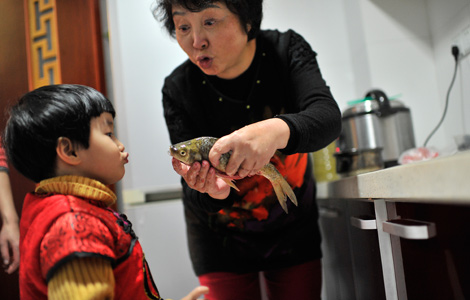Committee of 100 seeks to tackle 'sensitive' images about China
Updated: 2013-12-23 05:04
By AMY HE in New York (China Daily USA)
|
||||||||
|
|
| Video by Wan Li. Click to watch on Youtube |
There has always been a particular sensitivity in the US toward Chinese accomplishments in areas such as science and technology, mused Clarence Kwan, chairman-elect of non-profit Committee of 100, and never more clearly illustrated in recent headlines about China's first landing on the moon, he said.
"Even if you look at today's Wall Street Journal, when they talk about the Chinese moon-landing, they talk about the fact that [the Chinese] are stealing technology," said Kwan in an interview with China Daily. "In the US, they're very sensitive about the Chinese scientists stealing secrets — there's actually a congressional paper on how the Chinese government has targeted some Chinese American scientists to serve their purpose."
Suspicions like these don't help further political relations between the countries — which Kwan likened to a "thorn" in the ties — so it is the job of organizations like the Committee of 100 (C-100) to help both Chinese and Americans navigate through these tense waters, Kwan said.
C-100 launched a pilot program in San Jose, California, in November — specifically for Chinese and Chinese American scientists and engineers — that educates these experts on the risks of circumventing US laws on trade secrets, espionage, and export controls. The workshop was led by C-100 members, former federal prosecutors who are familiar with US law and how the Chinese can avoid any possible violations.
"The US always valued innovation and it's very protective of their intellectual property rights," said Kwan. "They feel the Chinese are taking a shortcut by stealing, so that unevenness in the dealing creates a lot of pressure on US-China relations."
Kwan, who was elected as chair this year and will begin serving next April, said that C-100's main goal was to help shape US-China relations so that there is less "unevenness" in the dialogue.
One of their programs — China Delegations — was started in 2007 after a C-100 survey showed that respondents thought "neither the Chinese nor the American public believes that their country is accurately portrayed in the other country's news media." The program brings US journalists and civic leaders (academics, business leaders) to China to explore the country and to talk to an array of individuals, including government officials, villagers, and scholars.
"We want to help make sure that those contributing to the discussions and dialogue have a proper view of China, instead of a singular view," said Kwan. "Many of them write about China but have never set foot in China."
Established in 1990, C-100 is a non-partisan membership organization formed to "provide a collective voice for Chinese American leaders to speak to both US and international issues," according to its mission statement. The concept of the organization came to be after I.M. Pei found himself the subject of numerous inquiries from the press on events taking place in China.
Pei felt that "no single individual could adequately represent the Chinese American perspective," and set out to create a Chinese-American forum with other notable Chinese-American figures, such as Yo-Yo Ma, Shirley Young, and Oscar Tang.
The committee, which has 154 Chinese-American members, does not have any political affiliation and is funded through membership dues and donations and voluntary contributions.
"We're not a government propaganda organization," Kwan said. "[China Delegations participants] trust that we can take them to China and give them a more diverse view of China, not just the official view of China." Past delegation participants include David Brooks, a columnist with the New York Times, and Jill Abramson, now executive editor of the New York Times, Gary Silverman of the Financial Times, and Noel Lateef of the Foreign Policy Association.
After a year of major US-China news — China's transition into a new era of leadership, the Sunnylands summit with the two countries' presidents, China's new air defense zone — Kwan said that the two countries still have "issues," but those issues will work themselves out.
"The level of co-dependence is extremely high, so no single party can afford to jeopardize that relationship," he said. "We have to accept that there are two parallel tracks: one is the political side and one is the economic side." Geopolitical tension is "unavoidable," but collaboration and co-dependence will continue, he said.
As C-100 moves forward with its operations, Kwan said that the committee is interested in taking dialogue from mere exchange to visible action.
"Exchange is just learning about each other; it's a secondary learning. But if you can make people work together, then they will learn first-hand how to deal with each other on a cross-cultural basis," he said. "If we look in the next few years, that will be the major shift we'll be looking to: let's not just talk about it, let's do something together."
amyhe@chinadailyusa.com
Most Viewed
Editor's Picks

|

|

|

|

|

|
Today's Top News
Judge won't extend order keeping brain-dead girl on ventila
Delicious, festive holiday choices abound for expats
Shanghai to soar on FTZ wings
Visa reform urged for China
Mend ties, top adviser tells Tokyo
Experts defend hepatitis B program
Tight budgets of the elderly cause issues
Caregivers in high demand
US Weekly

|

|
















